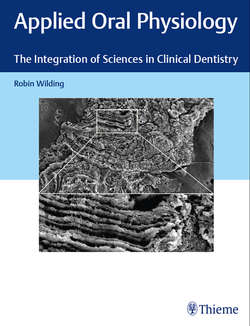Читать книгу Applied Oral Physiology - Robin Wilding - Страница 67
На сайте Литреса книга снята с продажи.
4.2.3 Rate of Flow of Saliva
ОглавлениеThe mouth is bathed by a resting flow of saliva which during the day is a total of about 1 L. This ensures that the mouth and throat are kept moist at all times. During sleep the rate of flow is almost unmeasurable and accounts for the dryness of the mouth on waking. In other circumstance, particularly feeding, the rate of secretion of saliva increases. The following factors are important in the stimulation of saliva which is driven by the activity of both sympathetic and parasympathetic nerve pathways.
• Taste: Taste is the most potent salivary stimulant. Different modalities vary in their power to stimulate saliva flow. Sour food ranks highest through salt and sweet to bitter tasting foods. One of the functions of the water in saliva is to dissolve and spread food chemicals (see Chapter 10.6 Taste).
• Mastication: When food is held between the teeth, a little saliva flows from the ipsilateral (same side) glands. As further bite force is exerted, receptors in the periodontal ligament send impulses to the brain and the rate of flow is increased. These events have been described as the masticatory–salivary reflex.
• Touch: Stimulation of nerve endings in the oral mucosa, particularly by spicy or irritating substances, produces an increase in flow rate of saliva. Hot or cold water also has a stimulating effect. In some areas of the oral cavity, such as the soft palate, even light touch causes an increased flow of saliva. This may be a response to enable swallowing and a protective response to the onset of retching.
• Sight, smell, and thought: The presence of food, or even the thought of it, increases salivary secretions. Some foods like lemons or onions have a particularly strong effect even at a distance from the mouth.
• Nausea and vomiting: Copious amounts of saliva are released during vomiting. This may be a protective reflex, protecting the oral cavity from stomach acids which are sufficiently concentrated to damage the oral mucosa and etch tooth enamel.
• Nutrition: Malnutrition causes irreversible damage to the salivary glands of rats if it occurs during infancy. During later years, malnutrition in human children has been shown to reduce the rate of saliva secretion and the protein content.
• Drugs: Several drugs which are mood altering (antidepressants and tranquilizers) reduce salivary secretions.
• Ageing: During ageing all mucosal secretions are reduced, and this may lead, in the oral cavity, to the onset of root surface caries.
• Radiation: One of the undesirable side effects of radiation treatment for oral tumors is damage to the acinar cells of the salivary glands. The xerostomia (dry mouth) which develops is usually permanent and requires special preventive measures to be put in place in order to prevent caries in patients who have had radiation treatment.
Saliva is an active secretion from both major and minor salivary glands. The three major salivary glands are the parotid, submandibular, and sublingual glands. The composition of saliva varies according to the types of secretory gland (see Appendix D.2 Salivary Gland Secretion).
